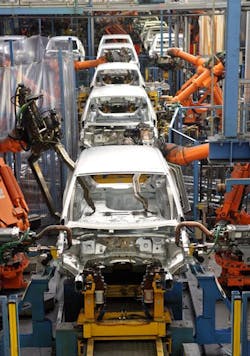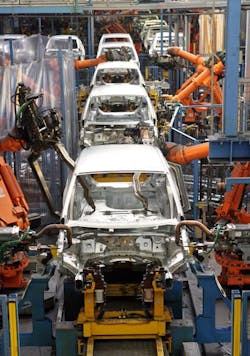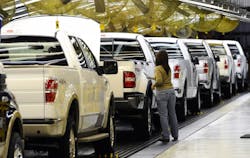Supply chain concerns among top auto industry worries
So when automotive OEMs and their suppliers list “transportation legislation” and “supply chain concerns” as two of their biggest worries heading into 2013, it gives trucking companies an opportunity to sit at a table they typically don’t get invited to.
Let’s face it: like in many industries for time out of mind, automotive manufacturers and their suppliers usually focused on finding the least expensive transportation option that could still meet tight just-in-time deadlines.
Now, however, with demand for vehicles and related parts on the rise, there seems to be something of a shift in that view as many in the auto industry are recognizing there’s no longer an abundance of trucking options for their goods – and that a variety of pressures may shrink trucking capacity down even further.
These are just some of the sentiments uncovered in the 2012 Dykema Automotive Institute Survey: Industry Challenges, conducted by the automotive practice within the Dykema law firm.Aleks Miziolek, director of Dykema’s automotive industry group, noted that her firm’s survey (conducted back in July) found that “boom times” of a sort are back for the automotive industry, with 93% of respondents saying they’ve experienced an increase in demand for their vehicles, parts and services in the past year.
Yet despite such optimism, more than a third of the executives polled by Dykema (39%) believe that raw material costs will pose the greatest challenge to their company’s supply chains in the coming year.
“For the auto industry, these are interesting times,” Miziolek said. “Every major company has gone through tremendous upheaval and dealt with changes to every aspect of its operations. The survey shows that while the automotive industry is emerging strongly from the depths of the global recession, there are many challenges still on the horizon for automotive executives that may impact the long term success of the industry.”
Here are some other findings from Dykema’s survey:
- The top legislative issue for 30% of automotive companies is energy and environmental legislation, with 26% pointing to transportation legislation as their main worry, followed by tax reform at 15%.
- Raw material costs pose the greatest challenge ahead to supply chains, according to 39 percent of respondents. Meanwhile, 21% of respondents list banks’ limited financial lending to auto companies as the biggest challenge, while 19% reference financially troubled suppliers. Only 13% of respondents overall say labor union issues are the primary challenge.
- The auto industry is not fully prepared for another natural disaster. In the wake of the March 2011 tsunami that hit Japan, the Evonik fire and other recent natural disasters that have impacted the automotive supply chain drastically, 41% of respondents stated they have not instituted crisis management teams to be used under Force Majeure.
- Class actions remain a real source for concern, particularly for OEMs, due to their potential to adversely affect an automotive company’s brands, corporate reputation and bottom line.Some 22% of respondents, most of them OEMs, report an increase in class action lawsuits in the past two years. In addition, 58% of those surveyed confirmed their organizations have taken steps in the past two years to try to reduce their exposure to class action litigation.
- Some 56% of respondents seem prepared to engage in more merger and acquisition (M&A) activity in the coming year, saying they plan to move forward with an acquisition. However, 43% of respondents say their companies decided not to move forward with an acquisition in the past year.
Privacy is also a major concern, with 52% percent of respondents identifying the unauthorized use of data as a key privacy issue. Meanwhile, a quarter of the industry representatives surveyed worry that consumers could reject technology, such as vehicle tracking, due to privacy concerns.
From a strategic perspective, at least, many of the things worrying automotive industry executives touch on transportation in many places – especially when it comes to dealing with “disaster response.” That could open doors for the trucking industry in terms of crafting supply chain support mechanisms in case disaster rears its ugly head (whatever the form such a “head” may take).
That’s something to think about at least.
*******************************************
If you've been bold enough to the read the entire post above, let me reward you with a absolutely classic moment in college football history that occurred 30 years ago on Nov. 20 (a date just a month away).
Yes, it's the 1982 victory by the University of California over Stanford and if you have seven minutes to spare, you can watch the thrilling comeback by Stanford's QB John Elway (yes THAT John Elway) end up being squelched by an even more dramatic kickoff return by the Golden Bears.
Happy Friday to you!



